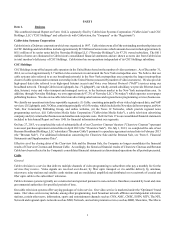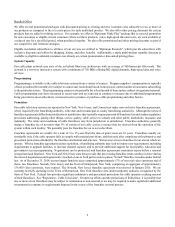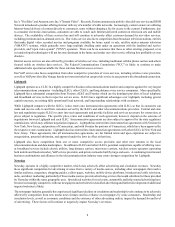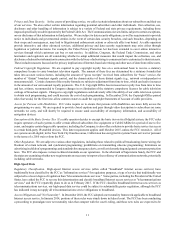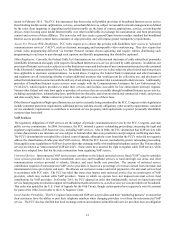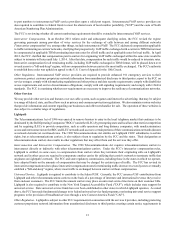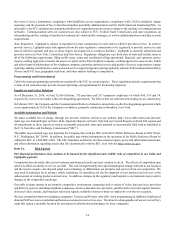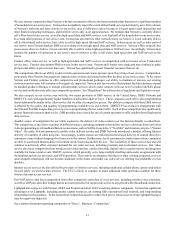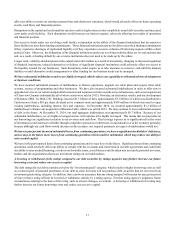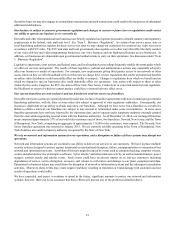Cablevision 2014 Annual Report Download - page 15
Download and view the complete annual report
Please find page 15 of the 2014 Cablevision annual report below. You can navigate through the pages in the report by either clicking on the pages listed below, or by using the keyword search tool below to find specific information within the annual report.
9
Regulation
Cable Television
Our cable television systems are subject to extensive federal, state and local regulations. Our systems are regulated under
congressionally imposed uniform national guidelines, first set forth in the Cable Communications Policy Act of 1984 and amended
by the Cable Television Consumer Protection and Competition Act of 1992 and the Telecommunications Act of 1996 (collectively,
the "Federal Cable Act"), as well as under other provisions of the Federal Communications Act of 1934, as amended and other
statutes. The Federal Cable Act, Federal Communications Act, and the regulations and policies of the FCC affect significant
aspects of the Company's cable system operations.
The following paragraphs describe the existing legal and regulatory requirements that are most significant to our business today.
Franchising. The Federal Cable Act requires cable operators to obtain a franchise in order to provide cable service. Regulatory
responsibility for awarding franchises rests with state and local franchising authorities. Federal law prohibits our franchising
authorities from granting an exclusive cable franchise to us, and they cannot unreasonably refuse to award an additional franchise
to applicants that seek to compete with us. The states in which we operate, New York, New Jersey and Connecticut, have enacted
comprehensive cable and video service regulation statutes that are applicable to cable operators and other providers of video
service, such as Verizon and Frontier. Although the terms of franchise agreements differ from jurisdiction to jurisdiction, they
typically require payment of franchise fees and contain regulatory provisions addressing, among other things, service quality, cable
service to schools and other public institutions, insurance, and indemnity. State and local franchising authority, however, must be
exercised consistently with the Federal Cable Act, which sets limits on franchising authorities' powers. The Federal Cable Act
restricts franchising authorities from imposing franchise fees greater than 5% of gross revenues from the provision of cable
television service, prohibits franchising authorities from requiring us to carry specific programming services, and protects us in
seeking franchise renewals by limiting the factors a franchising authority may consider and requiring a due process hearing before
denial of renewal.
Pricing and Packaging. The Federal Cable Act and the FCC's rules regulate the rates that cable operators may charge for basic
video service, equipment and installation. None of these rules applies to cable systems that the FCC determines are subject to
effective competition, or where franchising authorities have chosen not to regulate rates. In our cable systems, the FCC has made
"effective competition" findings in the majority of our communities covering substantially all of our customer base.
In areas not subject to effective competition, the Federal Cable Act and the FCC's rules also require us to establish a "basic service"
package consisting, at a minimum, of all local broadcast signals that we carry, as well as, if the locality requests, all public,
educational and governmental access programming carried by our systems. All subscribers are required to purchase this tier as a
condition of gaining access to any other programming that we provide. From time to time, Congress or the FCC may consider
imposing new pricing or packaging regulations, including proposals requiring cable operators to offer programming services on
an unbundled basis rather than as part of a tier or to provide a greater array of tiers to give subscribers the option of purchasing a
more limited number of programming services.
Must-Carry/Retransmission Consent. Cable operators are required by the "must carry" provisions of federal law to carry, upon
request and without compensation, the programming transmitted by most local broadcast stations, and, in cable systems that are
not fully digital, to offer analog-only customers low-cost set-top boxes to make those signals "viewable".
Alternatively, local television stations may elect retransmission consent. Stations making such an election give up their must-
carry right and negotiate with cable systems the terms on which the cable systems carry the stations. Cable systems generally may
not carry a broadcast station that has elected retransmission consent without the station's consent. The terms of retransmission
consent agreements frequently include the payment of compensation to the station. A substantial number of local broadcast stations
currently carried by our cable systems have elected to negotiate for retransmission consent. While we currently have retransmission
consent agreements with all such broadcast stations, the potential remains for carriage of such stations to be discontinued if any
of such agreements is not renewed following its expiration.
In the wake of publicized disputes between several cable operators and broadcasters, Congress enacted some minor reforms to the
retransmission consent scheme that restrict broadcasters from employing specific negotiation techniques. Congress also directed
the FCC to reexamine its standards for determining whether a party is negotiating in good faith as required by the rules. The FCC
also has an ongoing proceeding to consider changes to its rules governing retransmission consent negotiations.
Ownership Limitations. Congress has required the FCC to set a national limit on the number of subscribers a cable company can
serve, and a limit on the number of channels on a cable television system that can be occupied by video programming services in




